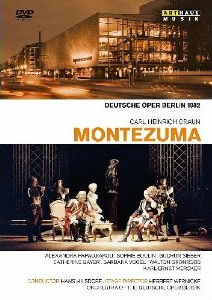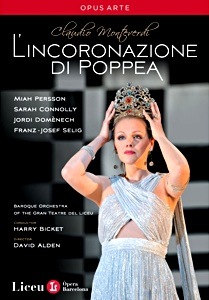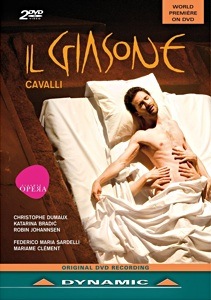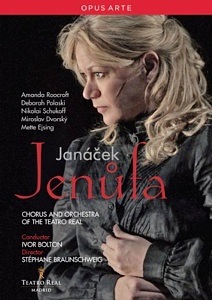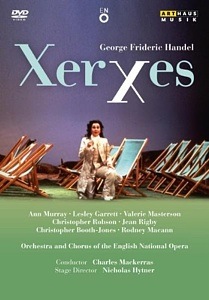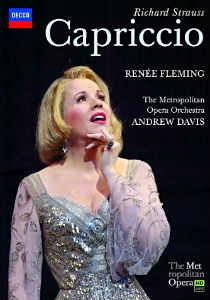
Henson Keys
The cover picture on the Opera Australia’s DVD of a 2011 production of Mozart’s Don Giovanni is rather startling.
Sometime in 1753, Frederick The Great of Prussia, following a tiff with his great friend Voltaire, began writing an opera libretto in French prose that was to elucidate his ideas about the role of an enlightened monarch.
L’incoronazione di Poppea nearly disappeared from the stage completely after its 1642 Venice premiere and a Naples revival in 1651.
Francesco Cavalli’s 1649 opera Il Giasone (Jason) was virtually a model of the many conventions that had come to be expected in Venetian public opera in the seventeenth century.
At first glance, Ivor Bolton, Chief Conductor of the Mozarteum Orchestra Salzburg, would seem an odd choice to lead Jenufa, Janacek’s grim tale of infanticide and oppressive village morality.
Nicholas Hytner’s much-travelled and well received 1985 production of George Frideric Handel’s 1738 opera Xerxes has been released on DVD from Arthaus Musik, in a performance recorded live from the English National Opera in 1988.
When I first watched the DVD Hvorostovsky in Moscow with guest star Sondra Radvanosky, I was absolutely amazed at the superb quality of the singing.
Capriccio skates along on a fine line between a fascinating idea-driven debate about the purpose of art in the wider world and a rather fussy narrow debate about text and music interesting only to those interested in opera as theatre.
Only because I am a member of the You Can Never Have Too Much Callas School of Opera Listening can I recommend EMI’s new release The Callas Effect. The beautifully packaged production is the size of a small paperback book and consists of two CDs with 29 arias sung by Callas plus a new 70-minute…
When Mojca Erdmann’s new debut CD for Deutsche Grammophon was reviewed in the September issue of Opera News, the disc’s cover art showed the lissome German soprano in a thin, revealing white dress, lying on a bed of roses. The album was then called Mostly Mozart. When that review questioned the titling, DG must have…
With his new CD release for Decca, The Maltese Tenor, Joseph Calleja clearly declares his ascension to the top level of the world’s lyric tenors. The 15-selection program shows that his plaintive voice has matured and clarified, his emotional understanding of the music has deepened significantly, and his artistry has moved to a higher level. …
I would never have imagined that the story of Anna Nicole Smith could be today’s entry in a long line of opera’s “fallen women”—pop culture’s reinvention of Violetta, Manon Lescaut, and Lulu. But that is indeed what composer Mark-Anthony Turnage and librettist Richard Thomas have created in Anna Nicole, commissioned by England’s Royal Opera House…
Deutsche Grammophon has just released Anna Netrebko: Live at the Metropolitan Opera, a CD with 11 excerpts recorded live from her Met performances from 2002 through 2010. Released to feature the soprano just prior to her opening in the Met’s Anna Bolena, the CD features Netrebko singing solo arias as well as duets with such…
Sony Classical, in association with The Metropolitan Opera, has begun issuing on CD a number of historic Met broadcasts, newly remastered. The first I received for review was the December 10, 1955 broadcast of Verdi’s Un ballo in maschera, perhaps most notable for the Ulrica of Marian Anderson, who earlier that year made her debut…
In the fall of 2010, director Andrei Konchalovsky and conductor Gianandrea Noseda struck up a collaboration for a new production of Mussorgsky’s Boris Godunov, to be performed at Teatro Regio Torino, co-produced with Palau de les Arts Reina Sofia of Valencia and Fondazione Lirico Sinfonica Petruzzelli e Teatri di Bari.
Classical music writer and opera critic Robert Levine has written a very pleasant new book, Weep, Shudder, Die, A Guide to Loving Opera, published by HarperCollins Books. Levine sets up the book’s premise early in his introduction: “Could singing… make one, as the composer Vincenzo Bellini said, ‘weep, shudder, die’ and at the same time…
Danish composer Poul Ruders, having been deeply moved by Lars von Trier’s 2000 film Dancer in the Dark, used his third commission from the Royal Danish Theatre to create a 75-minute opera based on this tragic story of a mother’s sacrifice to save her son from hereditary blindness. The result is a small masterpiece, renamed…
One of the many pleasures of reviewing CDs and DVDs is the discovery of an unfamiliar composer whose works are original, fascinating, and moving. Such is the case with Irish composer Donnacha Dennehy, and his new Nonesuch CD of the concert piece “Gra agus Bas” (Love and Death) and a 6-song cycle entitled “That the Night…
In Robert Carsen’s 2004 production of La traviata for Teatro La Fenice, the Prelude is staged. During this haunting music, we see Violetta lounging on a huge bed while more than a dozen men pay her for her services with wads of oversized dollar bills. By the time Act One begins, the bed is virtually covered…
David McVicar’s ravishingly lurid 2008 production of Strauss’s Salome for the Royal Opera House Covent Garden has been issued as an HD-filmed DVD from Opus Arte. Now, Strauss’s music is ravishingly lurid on its own, so I came to this production, which claims as a visual source reference the Pasolini film Salo, The 120 Days…
In 1967, Rolf Liebermann , General Manager of the Hamburg State Operas, undertook to produce 13 operas for television, securing the Hamburg-based film and television company Polyphon Film und Fernsehgesellschaft to record the productions with the original Hamburg casts. The director Joachim Hess adapted the stage productions for the requirements of television. The second of…
BelAir Classiques has released a DVD of a 2007 production of Die Walküre, filmed in HD at the Festival D’Aix en Provence, a co-production with Osterfestspiele Salzburg. While not an unwelcome addition to the numerous DVDs available of this work, it is certainly not an essential one. This production is just not bad enough to…
In 2006, Aribert Reimann was offered a commission to create a new work for Vienna State Opera. After initial hesitation—”The creative process can sometimes be rather a struggle and isn’t necessarily a pleasant experience”—he went to work. After a flirtation with a Camus drama, he settled on Franz Grillparzer’s version of Medea as his subject…
In 1804, E.T.A. Hoffmann became acquainted with Schlegel’s translations of Spanish plays in Spanisches Theater. During an illness in 1807, he returned to the Schlegel and discovered Calderon’s Die Scharpe und die Blume, finding it an ideal operatic subject. He composed the opera in Warsaw and Berlin, and began seeking a theatre that would present…


